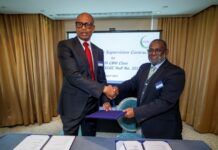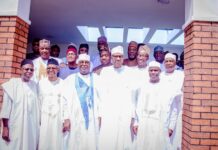Ime Akpan
The director general and chief executive officer of the Nigerian Maritime Administration and Safety Agency (NIMASA), Dr Bashir Jamoh came on board the organisation with a compelling vision to turn around its fortunes and make Nigeria’s waterways unattractive to sea pirates.
Appointed DG/CEO in March 2020 and with over 30 years experience in the maritime industry, Jamoh was already on a terra firma and wasted no time to get the ball rolling.
In February, 2021, he rolled out the Integrated National Security and Waterways Protection Infrastructure, otherwise known as the Deep Blue Project (hereinafter referred to as DBP), to rid Nigeria of insecurity on its waterways.
The programme was officially unveiled by President Muhammadu Buhari on June 10, 2021. Specifically, the DBP is designed to enable Nigeria wage a full-scale war against pirates and other non-state actors in order to guarantee the safety and security of Nigeria’s maritime space, including its exclusive economic zones up to the Gulf of Guinea.
The project which Jamoh described as the “first of its kind in the annals of maritime security in Nigeria” comprises two special mission vessels, three special mission helicopters and four unmanned air vehicles/drones. Others are 16 fast-moving interceptor boats and 17 armoured vessels.
In addition, there are over 300 specially trained personnel for the maritime security unit of the NIMASA’s command, control, communication, computer, and intelligence (C4i) centre. The C4i Centre is NIMASA’s contribution to the joint surveillance supervision effort involving the Nigerian Ports Authority (NPA), the Nigerian Navy’s Falcon Eye and the Nigerian Police.
Experts say the initiative has proved to be the panacea for the incidence of piracy, armed robbery and other maritime crimes that have thwarted economic and social activities in the country’s sector for a long time.
The International Maritime Bureau (IMB) in its second quarter of 2021 report said piracy in the Gulf of Guinea dropped to the lowest since Q2 2019 after the enforcement of the DBP.
By the end of the third quarter of that year, it was reported that sea piracy on Nigerian waters declined by 80 per cent after the country had lost over $783 million to piracy in the Gulf of Guinea.
“We have recorded a drastic reduction in piracy and this is enough for us to beat our chest that we are ready to return to the category ‘C’ of membership of International Maritime Organisation (IMO).
“However, the year 2021 has witnessed a significant turnaround under my leadership as insecurity on Nigerian waters has reduced by 80 per cent,” Jamoh told journalists.
He recalled that the last time Nigeria had a drop in piracy attack in the nation’s waterways was in 1994 stressing that the DBP, country’s waterways had been listed on the Top 10 chart of safest waters in the world.
He said the achievement was enough reason to sensitise and inform the international community that the Nigerian waterways are now safer than ever before.
Commending the initiative, Prof Pat Utomi said Jamoh’s DBP and the blue economy initiatives have brought massive gains to NIMASA and the nation’s economic diversification goals.
“The fight against piracy in Nigeria’s waterways has been aided largely by the Suppression of Piracy and Other Maritime Offences (SPOMO) Act of 2019, which has now made it possible for piracy suspects to be charged to court – something that was not possible before now, which greatly impeded the fight. Through the instrumentality of the law, 20 pirates are currently serving various jail terms for piracy and other maritime offences.
“The success of the blue economy programme is going to be dependent on the success of the deep blue project. Despite the relative success that has so far been recorded in terms of reduction in piracy cases in Nigeria’s waterways since the commencement of implementation of the project, NIMASA is aware of the fact that it is not yet Uhuru. There is still a lot be done to have a fully secure and safe maritime environment that would allow active and unfettered participation of Nigerians in the blue economy,” Jamoh wrote in an article in The Guardian.
He revealed that the commencement of the blue economy will see more effective implementation of the deep blue initiative within the country’s internal waters, not just in the Atlantic Ocean, but also in the rivers, lakes, creeks, and even swamps – wherever economic potential abound, which has the likelihood of attracting the participation of Nigerians.
“It’s an attempt to kill two birds with one stone – encourage participation in the blue economy and securing the environment with the deep blue project,” he added.
The DBP has received international buy-in. What with the June 2022 signing of a $2.78 million exchange of note agreement between Nigeria and the Japanese government for an economic and social development programme.
The agreement involves the acquisition of high-speed boat to reinforce services for coastal security in Nigeria, with NIMASA as the implementing partner.
“The procurement of the high-speed boat worth $2.78 million will greatly enhance the operations of the deep blue project,” said the minister of state for finance, budget and national planning, Mr. Clem Agba, who signed on behalf of Nigeria while the Japanese ambassador extraordinary and plenipotentiary to Nigeria, Mr. Kazuyoshi Matsunaga, signed on behalf of his country.
Locally, NIMASA has partnered with the Nigerian Navy and other stakeholders to change the narrative about Nigeria’s territorial waters and waterways as haven for belligerent sea sovereigns.
The new collaborative arrangement involves information sharing between agency’s C4i and intelligence centre of the deep blue project and the Navy’s Falcon Eye to help track and combat criminal elements in the Nigerian maritime territory.
For its part, the federal government has shown its commitment to the DBP by acquiring additional mobile assets including two unmanned aircraft system, nine interceptor patrol boats and 10 armoured vehicles for enhanced maritime security.
The equipment, according to Jamoh would “assist us in building on the gains already recorded in the fight against piracy, sea robbery, oil theft, kidnapping, illegal fishing activities and others.”
No doubt, Jamoh has provided exemplary leadership in driving the DBP. In compliance with the International Ship and Port Facility Security, also known as the ISPS Code, he has leadership has ensured enhanced security to the ports such that about 22 port facilities in Nigeria are now ISPS Code-compliant.
Background
Jamoh hails from Kaduna State. He served in the Kaduna State Government before joining then National Maritime Authority (NMA) in 1994.
Until his appointment, he was the executive director, finance and administration in NIMASA.
Before that he served as the agency’s assistant director in charge of training and development.
Jamoh holds a PhD in Logistics and Transport Management from the University of Port Harcourt, a Master’s degree in Management from the Korea Maritime and Ocean University in South Korea, an Advanced Diploma in Management from the Bayero University Kano, a Professional Certificate in Materials Management from the Institute of Logistics in the UK and a Diploma in Accounting from the Ahmadu Bello University Zaria.
The NIMASA DG is a fellow and member in many reputable national and global professional bodies including Fellow, Institute for Service Excellence and Good Governance; Chartered Institute of Administration of Nigeria; Institute of Business Development; Academy of Entrepreneurial Studies; Institute of Public Diplomacy and Management; Institute of Information Management; Member, Chartered Institute of Personnel Management; Institute of Maritime Economist (Canada); Institute of Logistics (London), Nigerian Institute of International Affair, National Speakers Association (NSA) and Global Speakers Federation (USA).
Besides, he has received several distinguished merit award for exemplary leadership achievements in Maritime Education in Nigeria from the Institute of Leadership, Development for the Public Good, Kansas, USA; Institute of Transport Administration of Nigeria and International students of the Faculty of Law, Bayero University, Kano.
Honours
In recognition of his meritorious service at NIMASA, Jamoh has been conferred with numerous awards including *Zik Leadership Prize in Public Policy for 2020 (Public Policy Research and Analysis Centre, PPRAC), *Public Sector Icon Award 2021 (Vanguard Newspaper), and *Public Service Personality of the Year 2021 (Top10 Magazine), etc.































































